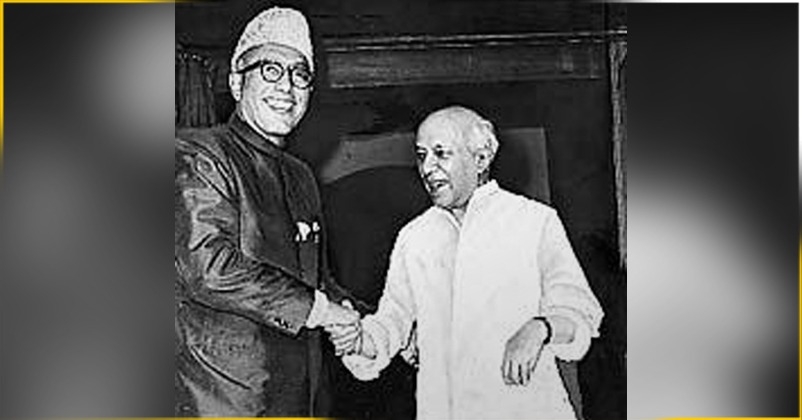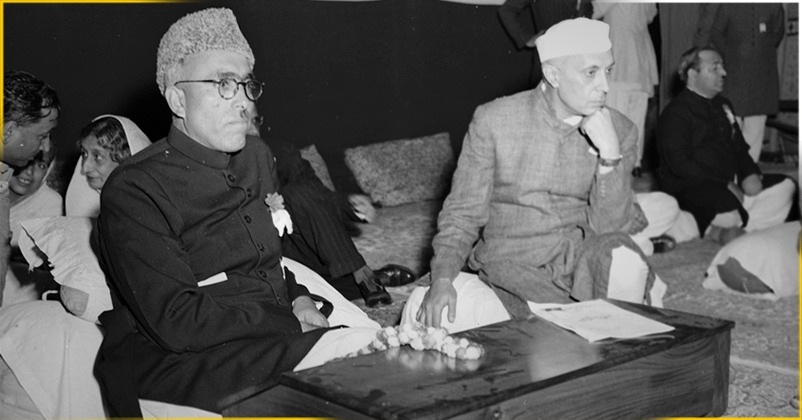Delhi Agreement: Hype V/S Reality- An Agreement between 2 Individuals with No Constitutional Sanctity
24 Jul 2019 17:23:03

An agreement was drawn between New Delhi and J&K leadership (to be specific Sheikh Mohammed Abdullah the then appointed Prime Minister of J&K State) in 1952, commonly understood as Delhi Agreement. People generally call it an agreement between Jawaharlal Nehru and Sheikh Abdullah. Some even say that, it was a document prepared through which Jawaharlal Nehru wanted to make the desires of Sheikh Abdullah all compulsions for any one in Chair who followed after Nehru. A very simple question could be raised by anyone who has no bias. The question is: When Article 370 was already in place w.e.f from 26th January 1950, what was the need of the Delhi Agreement in August 1952? Here, again I would ask whether Jawaharlal Nehru and his cabinet was superior to the Constitution of India or the Parliament of India or the Constituent Assembly of Jammu and Kashmir { that started her proceeding on 31 Oct 1951}. No doubt, it is asserted that the agreement was discussed in the Union Parliament on August 7, 1952 and was accepted by using the brute majority of Congress even after sharp opposition from Opposition Leaders. The Jammu and Kashmir Constituent Assembly discussed the arrangement and finally adopted a motion of approach on August 21, 1952. How funny JK Constituent Assembly adopted a motion of acceptance after Parliament. It could be said that the Delhi Agreement was the will of Sheikh Mohammed Abdullah endorsed by Jawahar Lal , but Sheikh still feared that the Constituent Assembly of JK may not surrender fully before his desires and hence the Delhi Agreement was also discussed in Parliament before the Constituent assembly had it. Otherwise there was no need for this. More over in case the Constituent Assembly had finalized all its policy and Draft Articles, sections of the State Constitution, then why did it take 5 more years to accept and put in force the State Constitution. It is also alleged that Sheikh Mohammed Abdullah was working on some network of plans woven around his own personal ambitions or serving interest of of his, He feared that the democratic assemblies and governments in the coming days may force him to enter into competitive power games , that he could not afford. So Sheikh Abdullah though was in favor Indian state wanted to make his position unquestionably sure , he might have used the bundle of mistakes done by Jawaharlal Nehru before and like statements at time of acceptance of 1947 Accession as well as filing complaint in UN Security Council against Pakistan on 1st January, 1948, in pressurizing Jawahar Lal Nehru.
Regarding to Delhi agreement Sheikh Mohammad Abdullah, the then Prime Minister of Jammu and Kashmir, had earlier stated “the main consideration before our Government was to secure a position for the State which would be consistent with the requirements of maximum autonomy for the local organs of the State power which are the ultimate source of authority in the State while discharging obligations as a Unit of the federation".
Later on the difference appeared in the Sheikh's Cabinet itself. The difference of opinion reached a peak when Sheikh Abdullah, instead of implementing the agreement, allegedly started advocating something like ultimate distancing from the other States of the Union. The people of the State were quick to perceive the danger of such a course as they had already seen the tribal attack in 1947 that had caused devastations as a direct consequence of Kashmir’s isolated position. There were even rumors that United States was prompting Kashmir’s independence". Events thereafter point that Sheikh Abdullah was accused both by his colleagues in the Cabinet and people of trying to create a State for himself. In fact, it was said that three members of his Cabinet had submitted a memorandum to Sheikh Abdullah labeling accusations / charges on him. The whole matter was spotlighted when Bakshi Ghulam Mohd { Dy PM in Sheikh’s cabinet} took over as Prime Minister of Jammu and Kashmir on 9th August 1953 after Sadar-i-Riyasat reacted on the prevailing situations and dismissed Sheikh Abdullah from the post of Prime Minister of Kashmir on 8th August 1953 and dissolved the Cabinet. {< The Delhi Agreement as quoted at places mentions: The representatives of Kashmir Government conferred with the representatives of Indian Government and arrived at an agreement in order to endorse the main decisions of the Constituent Assembly of the State of J&K. This arrangement was later on known as the "Delhi Agreement, 1952".
Delhi agreement was not the word of God
Some people have opined that the 1954 Presidential order had to implement the Delhi Agreement and was made in haste even when the State's Constitution was yet to be framed? They also say that it was in some respects beyond the Delhi Agreement. Whereas THE CONSTITUTION (APPLICATION TO JAMMU AND KASHMIR)
ORDER, 1954 of the President nowhere mentions that the order sought to implement the 1952 Delhi Agreement. Moreover, there could be many other reasons / needs / principle fact on which the requirement for issuing such order was based. Order had to be based on Constitutional provisions as existed at time / acceptance of the State Government / Sadar-e-Riyasat / Constituent Assembly and let us say even on the basis of messages emerging from 1952 Delhi agreement. We have to look at the order and its validity.

Delhi Agreement and Sheikh Abdullah
Events took a tragic course in 1953. The Sheikh was dismissed from office on 8th August and imprisoned on August 9, 1953. A memorandum was given by the Colleagues of Sheikh Abdullah to Sheikh Abdullah., Interim Government on 8th August 1953. The memorandum said:
“Since the formation of the present Government, in spite of the constant endeavor of your colleagues to secure maximum agreement and unity in the formation and execution of essential policies in accordance with the mandate given by the people, you have frequently adopted certain arbitrary measures complete denial of the right of expression of opinion of even your own colleagues in the handling both of external and internal affairs of the State.” …. “But we regret to observe that you have not only disregarded the wishes of your colleagues in the Cabinet but have acted in the Legislative Assembly also in a manner which denied the right of freely expressing their opinions to the representatives of the people in regard to the basic policies pursued by the Government.” … “you have consistently refused to acknowledge responsibilities that devolve on you as the Prime Minister of the State by not following the declared policies that form the basis of the Government. You have tended to act in a manner that has generated uncertainty, suspense and doubt in the minds of the people of the State in general and of those in Jammu and Ladakh in particular." “The united will of the people stood solidly behind this act of Kashmir's accession to India. While accepting our request, the Government of India assured us of the right of self-determination for our people. After the convening of the Constituent Assembly, certain inescapable elaborations of the State's relationship with India were defined in the Delhi Agreement, of which you were the Chief Architect on our behalf. Your stand was unanimously endorsed by the Government, the National Conference, the Indian Parliament and the Constituent Assembly of the State. But you have not only deliberately delayed implementation of the agreements on these matters which form the sheet-anchor of our policy, but have purposefully and openly denounced these in public. You have thus arbitrarily sought to precipitate a rupture in the relationship of the State with India. Though it is true that the people of the State have the ultimate right to decide their future, the conditions of chaos and confusion which are being engineered today by you are bound to be fatal for the exercise of the right of self-determination by our people. Under these circumstances what seems inevitable is that interested foreign powers may well take advantage of and exploit the situation for their own selfish purpose. Mr. M.A. Beg has persistently been following policies of narrow sectarianism, and communalism, which have seriously undermined the oneness of the State. Unfortunately, you have been lending your support to his policies in the Cabinet and his activities in public. This has generated bitter feelings of suspicion and doubt in the minds of the people of various constituent units of the State. You have connived at all these unfortunate happenings and thus strengthened and encouraged the forces of disruption.
The result is that unity and the secular character, the two fundamental aspects of our State, stand threatened today.”… “We have been constantly urging upon you to put an end to these unhealthy tendencies and to undertake unitedly measures for restoring the moral of the people. In spite of our best intentions, we have failed in our efforts. It is, therefore, with great pain that we have to inform you of our conclusion that the Cabinet, constituted as it is at present and lacking as it does the unity of purpose and action, has lost the confidence of the people in its ability to give them a clean, efficient and healthy administration”). And the dismissal order was issued by Sadar e Riyasat on 8th August 1953 ( “Where as for some months I have been noticing with growing concern that there have existed acute differences of opinion between members of the Government on basic issues -political, economic and administrative-affecting the vital interests of the State; …..And whereas on these fundamental issues the view of a majority of the members the Cabinet are sharply opposed to the view held by the Prime Minister and one of his colleagues; ……And whereas efforts to work in harmony and pull together as a team having failed,……And whereas a state has reached in which the very process of honest and efficient administration has become impracticable; … I, Karan Singh, Sadar-e-Riyasat, functioning in the interests of the people of the State, who have reposed the responsibility and authority of the Headship of the State in me, do hereby dismiss Sheikh Mohammad Abdullah from the Prime Ministership of the State of Jammu and Kashmir, and consequently the Council of Ministers headed by him is dissolved forthwith". ). These are well speaking official documents that have not been challenged in any court / quashed by any court. No other stories need be quoted that Sheikh himself was accused by his colleagues for not being serious about Delhi Agreement where as some commentators have very much relied upon the Delhi Agreement. .